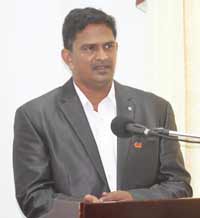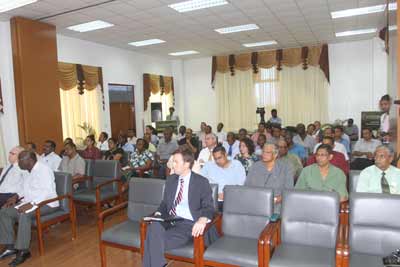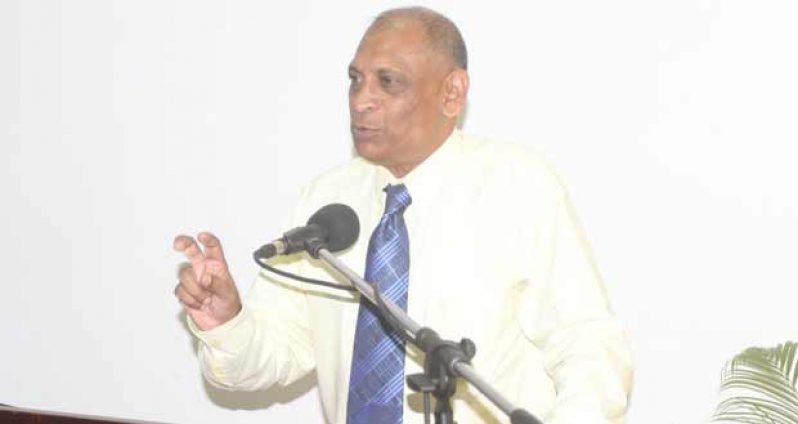THE Energy Resource Institute (TERI) of India, in collaboration with the Government of Guyana under the framework of the Low Carbon Development Strategy (LCDS), yesterday handed over a completed report on an energy audit of this country’s industrial agricultural sector.Coincidentally, at the presentation, Agriculture Minister, Dr. Leslie Ramsammy emphasised that the focus on energy efficiency is a “huge step” for Guyana, particularly since it represents a critical part of the nation’s

economic advancement.
He was speaking at the Guyana International Conference Centre (GICC), where the presentation took place, to the participating groups, including the Guyana Sugar Corporation (GuySuCo), the Guyana Rice Development Board (GRDB), the Guyana Forestry Commission (GFC) and the Guyana Manufacturing and Services Association (GMSA).
TERI’s energy auditing was part of phase two of its work in Guyana, under a Memorandum of Understanding (MOU) with the Government, which was signed in 2012 and has seen the Institute providing technical support to assist this country improve its energy efficiency across the productive sector.
According to Ramsammy, ignoring the role of energy and its efficiency would be “foolhardy”, considering the potential in this area; one of which is the increased competitiveness of good services when it comes to the cost saving factor and two, the opportunity for development of other related areas.

Development trajectory
“No responsible country should ignore this,” he declared, adding that energy efficiency bolsters the development trajectory of Guyana’s LCDS.
The minister emphasised that Guyana is determined to move beyond the label of “underdeveloped” and move towards becoming a high-middle income country, an advance that can be supported by increased focus on energy efficiency.
Ramsammy pointed out that improving the livelihoods of the Guyanese people cannot be separate from improving the country’s industrial base.
He underscored the fact that agriculture is the largest manufacturing sector in the country and noted that, when it was being developed, the focus was on food security.
But in the last several years, that has expanded to include nutrition security, medicine and fashion potential, furniture manufacturing, environmental protection and non-renewable energy.
Ramsammy said that ethanol production in Guyana, is ongoing on a small scale but any expansions in this area will not be done at the expense of sugar production.
Advisor to the President on Climate Change, Mr. Shyam Nokta, also made remarks on the occasion, pointing out that Guyana’s engagement with TERI has seen invaluable support.
Third phase
He announced that this engagement will be extended to a third phase, which will see the expansion of the focus on energy efficiency in social and productive sectors of society.
Nokta said energy efficiency has to be a lifestyle and behavioural approach, a concept that is also advanced under Guyana’s LCDS.
He also lauded the TERI team’s commitment to the groundwork.
Senior Specialist and Leader of the TERI team in Guyana, Dr. Narsimha Rao outlined the outcomes of their undertaking and the recommendations in the compilation, some of which are already being implemented.
He revealed that, in the sugar industry, a three-year plan has been completed to take on board the recommendations that came out of the study.
Rao explained that what was recommended were categorised between short, medium and long-term, so as to prioritise efforts to improve energy efficiency.
“The savings we will have is equal to a year’s operations of one of the factories,” he asserted.
Rao added that, in the rice sector, three millers are part of a pilot to implement a ‘Best Practices Manual’.
“We presented the case study and findings to millers at a meeting. So far, 10 more millers have come forward to say they want to be a part of the programme,” he reported.
The specialist said, in the forestry sector, changes have been recommended and the appropriate officials are looking at making them to improve the sector’s efficiency, particularly in the area of gasification techniques.
He explained that, in the big picture, the focus of energy efficiency is to increase output, with reduced input and less costs.
Rao said energy efficiency has also been cited, most recently in a World Bank compendium, as being the most effective in combating climate change, through reducing carbon emissions by as much as 65 percent.
He warned that ignoring the potential of energy efficiency will result in greater risks, in particular for developing countries.
According to him, while inefficiencies in the energy sector is a global challenge, Guyana’s efforts can better position it to battle the devastating impacts of climate change.
Public awareness
Rao challenged the Guyana Energy Agency (GEA) to better its public awareness on the issue of energy efficiency, considering both the related benefits and risks.
He also committed TERI’s support to Guyana going forward.
The work of TERI was lauded by GMSA President, Mr. Clinton Williams, who highlighted the need for focus to be placed on the multiplying effect of the work in improving energy efficiency and the involvement of additional stakeholders.
A monitoring unit is expected to be set up soon to assess the progress of the implementation of the recommendations coming out of the energy audit.
(By Vanessa Narine)



.jpg)









